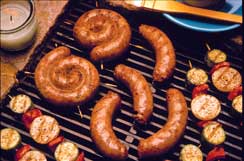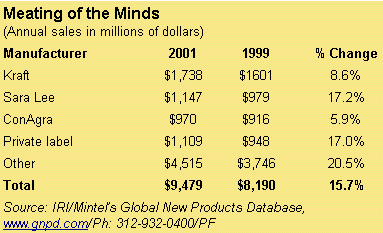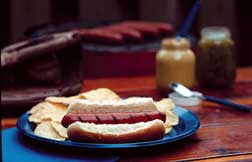
Three companies account for a major market share in this category—Kraft, Northfield, Ill.; Sara Lee, Chicago; and ConAgra, Omaha, Neb. Mintel notes that the market leaders began to refocus their efforts toward core brands in the late 1990s. While this increased marketing and support benefited some of the best-known brands (including Oscar Mayer, Jimmy Dean, Swift, and Hebrew National), the companies' smaller brands suffered as a result. In fact, Mintel foresees these efforts as a possible precursor to phasing out some of these smaller brands.
An example of this could be found in Kraft's Louis Rich brand. The company's Oscar Mayer brand has five times the sales of its next closest sliced lunchmeat competitor, Mintel reports, but growth of the brand has been moderated somewhat by sales declines in the Louis Rich brand, a major component of which is turkey, whose sales have been flat. The report states, “Kraft's energy to build core brands may be going more in the direction of Oscar Mayer.”
The Oscar Mayer brand already benefits from its longstanding status as an advertising icon. Certainly, the majority of consumers could easily recall that their bologna has a first name. However, the increasing tendency to skip meals or dine away from home puts breakfast and sandwich meat products in a risky situation.
Culling the Culinary
In the wake of the microwave mentality, declining culinary skills also could hold dire consequences for makers of breakfast meats, though Mintel believes ready-to-eat and pre-cooked varieties may help to combat this trend. Convenience is one of the main selling points for most foods, and many of this category's brands have items that address the changing nature of breakfasts and lunches.Both meals have evolved from once-traditional, sit-down meals or meals made at home and taken to work or school. Now, they are more apt to be from a restaurant or a ready-to-eat item. For that matter, consumers are likely to skip breakfast altogether, and there is an increasing likelihood that lunch will be avoided. When consumers do have breakfast, they are unlikely to eat traditional breakfast meats. Instead, they opt for yogurt, breakfast sandwiches and cereal, all of which are easily prepared and can be eaten on the go.
Convenience, therefore, is essential, though one more condition increasingly is needed to reach consumers. A willingness to eat some fat has led to a return to flavor, prompting strong growth in the bacon and dinner sausage categories. The fat acceptance has its limits, as the fastest-growing type of bacon is a premium, lean-cut brand.
As a whole, refrigerated bacon saw its sales grow almost 22% between 1997 and 2002, benefiting from new product introductions supported by heavy advertising. Most of this growth came in 2000, when many new varieties of reduced fat and turkey bacon led to sales growth of over 14%. Mintel speculates that the notion of this healthy alternative resulted in consumers feeling they could indulge in these new products. Furthermore, bacon's increasing acceptance as a sandwich filler should bode well for the segment.

ConAgra's Healthy Choice brand fell out of favor with consumers losing interest in low-fat products in some categories. ConAgra was not alone in this regard, as Sara Lee's Lean and Hearty brand met with similar results.
However, sales of refrigerated dinner sausages increased more rapidly than any other major type of breakfast and sandwich meat. One example that may explain the reasons behind this growth is Johnsonville Foods', Sheboygan Falls, Wisc., bratwursts which are bigger and more flavorful than frankfurters. Flavors in this segment range from cheesy to smoky to spicy. In addition, dinner sausages have a variety of applications and can be cooked in several manners, making them an interesting alternative to other processed meats.
Major brands continue to drive refrigerated dinner sausages, but private label sales have enjoyed fairly rapid growth. Sales of private label varieties jumped 48% between 1999 and 2001.
Furter More
Mintel believes that some of the dinner sausage success could have gone to frankfurters; however, a lack of innovation in the latter has led to relatively flat sales between 1997 and 2002. Nonetheless, the leading brands have benefited from strong advertising and have grown in sales over the period.ConAgra's Hebrew National brand was the strongest frankfurter performer for the period. This could further indicate the growing importance of flavor, as Hebrew National products have a stronger flavor than most frankfurters. However, ConAgra's success in this category has been tempered by a decline in its Healthy Choice line, similar to its performance in refrigerated dinner sausages.
ConAgra's pre-cooked breakfast sausage has been strong in the frozen breakfast and sandwich meat segment. Its convenient nature has boosted ConAgra to market-leading status, experiencing 33.8% growth from 1999 to 2001. ConAgra and Johnsonville, which itself grew 40% in that time, together control more than half of the frozen breakfast and sandwich meat category.
In the refrigerated portion of the breakfast sausage and ham category, sales have grown 17% from 1997 to 2002, largely the result of introductions and accompanying support in 2000 from Sara Lee's market-leading Jimmy Dean brand. While growth slowed in 2001, Mintel believes 2002 may hold more growth for the category, as new convenience-oriented products make their way to market.

Just a Slice
Refrigerated, sliced lunchmeat accounted for almost one third of all breakfast and sandwich meat sales in 2001, making it the largest category. Flexibility, variety and ease of use contributed to the success, though sales have been relatively stagnant since 1997. The launch of more poultry-based lunchmeats in 2000 boosted sales for the segment.Sales of refrigerated, non-sliced lunchmeat, though the smallest segment in packaged breakfast and sandwich meats, experienced a 10.6% increase from 1997 to 2002, much higher relative to its sliced counterpart. However, Mintel believes this category is likely to suffer from its lack of convenience.
Between 2002 and 2007, Mintel predicts the breakfast and sandwich meat category will decline almost 1%, though five of its seven segments are likely to grow. Leading the way should be a 27% growth in sales of frozen breakfast and sandwich meat, followed by refrigerated dinner sausage (20%), bacon (15%), refrigerated breakfast sausage and ham (12%), and non-sliced lunchmeat (7%). An increased number of convenience and pre-cooked options will lead to the sales growth.
However, the trend away from breakfasts and lunches is likely to continue, shrinking the market for these products. Marketers also should be aware that Mintel's consumer research found teens, in particular, unlikely to eat lunchmeat. With the proliferation of grab-and-go alternatives, breakfast makers also should be concerned about consumers abandoning hot breakfasts and the meats associated with them.
For more information on the report, “The U.S. Packaged Breakfast and Sandwich Meat Market,” contact Mintel International Group Ltd.; 213 W. Institute Place, Suite 208; Chicago, IL 60610; phone: 312-932-0400.
